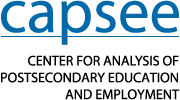Evaluating For-Profit Higher Education: Evidence from the Education Longitudinal Study
By: Yuen Ting Liu & Clive Belfield | September 2014
This study evaluates the postsecondary and labor market outcomes of students who attended for-profit colleges. The evaluation complements a similar study by Deming, Goldin, and Katz (2012) that found significant differences in outcomes between students in for-profit colleges and those in other sectors. In this study, the authors use the Education Longitudinal Study of 2002, a nationally representative survey monitoring the transitions of young people who were 10th graders in 2002, and compare outcomes during the college years and up to age 26.
In accord with Deming et al., the authors find adverse levels of borrowing and some evidence of wage penalties for students who attended a for-profit college. Paradoxically, however, these results are not associated with lower attainment levels, and there is little evidence that for-profit students were less satisfied with their college experience. These results hold even with detailed controls for ability, for alternative comparison groups, for selection into the for-profit sector, and for alternative designations of for-profit college enrollment. However, the combined effect of higher borrowing and lower earnings for students at for-profit colleges is substantial, such that the average returns to community college dominate those at for-profit colleges.
